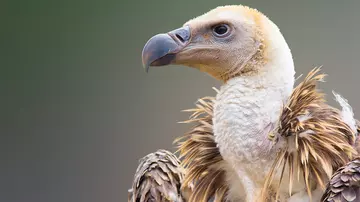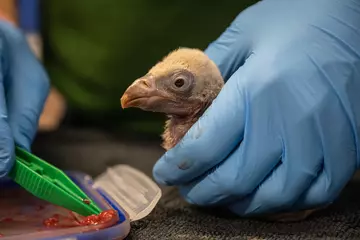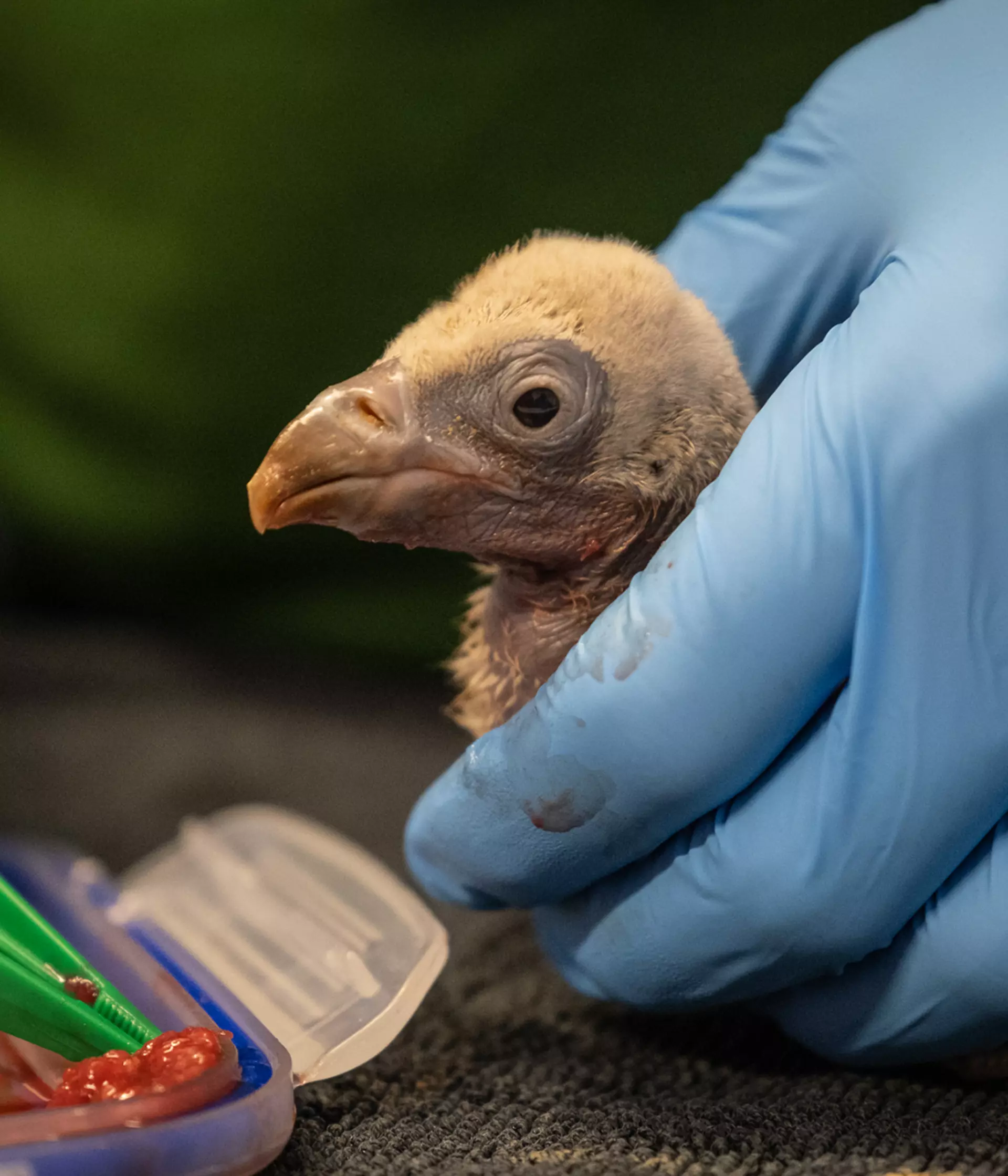Conservation success: Critically endangered vulture chick hatches at London Zoo for the first time in 40 years
Zookeepers at London Zoo are celebrating the hatch of a critically endangered Rüppell's griffon vulture - the first vulture to hatch at the conservation zoo in more than 40 years.
The fluffy grey chick, which weighed just 115g at hatch - the same as a bar of soap - had a dramatic start to life, as extraordinary footage from the zoo’s new vulture nursery shows.
Zookeepers were excited when mum Philomena laid her egg in mid-January but were concerned for its survival: her inexperience as a first-time mum had led her to leave her previous egg for long periods of time, which meant that sadly it never hatched.
To give the youngster the best chance of survival, this time, the team moved Philomena’s new egg, which they nicknamed ‘Egbert’, to a special vulture incubator, where they kept it at a toasty 36.8°C and monitored it closely. Meanwhile, a wooden dummy egg was swiftly placed into the nest by keepers for Philomena to patiently sit on.
“The hatching process can actually take a few days in total,” explained vulture keeper Robert Harland, who was on ‘eggwatch’ when the little one first broke through its shell. “As soon as the first break in the shell is made, the egg’s membrane starts to dry out, which can restrict its movement and prevent it from surviving the hatch – we saw this happening and knew we had to step in to help.”
Working with colleagues from Horstmann Trust – vulture specialists who offered support and guidance over video call - the team gently helped the little one to safety over the course of 40 minutes.
Egbert has kept zookeepers’ hands full since his eventful hatch (Wednesday 8 March), with zookeepers hand-feeding the youngster four times daily: the important chick will remain in their expert care until around three months of age, when it will be self-sufficient enough to be returned to its parents Philomena and Cuthbert. For now, the chick snuggles up to a surrogate cuddly toy owl in the cosy incubator.
“Since hatch, Egbert has gone from strength to strength and is now weighing a healthy 265g,” added Rob. “We’ve been feeding the little one a meaty protein shake of raw quail, mouse and rat meat which will help the chick put a hefty 7kg over its first 3 months.
“Once the chick has fledged, the zoo vet team will send a feather off for DNA testing to determine the bird’s sex - male or female, the youngster is an important part of the European Breeding Programme for the Critically Endangered species, a collaborative programme between conservation zoos to ensure a genetically diverse, healthy back-up population of this important species.”

Rüppell's griffon vulture are the world’s highest-flying birds, documented to have reached soaring heights of 10,973 meters above sea level – the same height as most aeroplanes. These extraordinary birds play a critical role in protecting ecosystems - by feeding on abandoned animal carcasses, they ensure the African countryside is free of harmful diseases.
London Zoo has a long history with vultures: they were one of the first animals at London Zoo - the world’s oldest scientific zoo - when it opened almost 200 years ago, but unfortunately, in that time the wild vulture population has plummeted; in just 11 years these spectacular birds went from being classified as being of ‘Least Concern’ in 2004 to ‘Critically Endangered’ in 2015.
ZSL, the international conservation charity behind London Zoo, has worked closely with Saving Asia’s Vultures from Extinction (SAVE) to protect vultures in Southern Asia: in 2006 London Zoo veterinarians flew to Nepal to investigate a spate of vulture deaths and were instrumental in successfully campaigning the governments of India, Nepal and Pakistan to ban the manufacture and importation of diclofenac - an anti-inflammatory used widely on cattle but lethal to the vultures who fed on their carcasses.
Robert added: “The ban of diclofenac and introduction of alternative anti-inflammatory meloxicam across Asia’s veterinary sector has since set the population of Asian vultures back on the right track – showing that nature can recover when species are protected.

“Egbert’s arrival is a brilliant conservation success, and shows the power of conservation zoos to restore and protect threatened species across the world.”
As well as vultures, visitors to the conservation zoo this Easter can learn all about other egg laying animals – from Humboldt penguins to tiny butterflies – at the Zoo-normous Egg Hunt (1 - 16 April).
